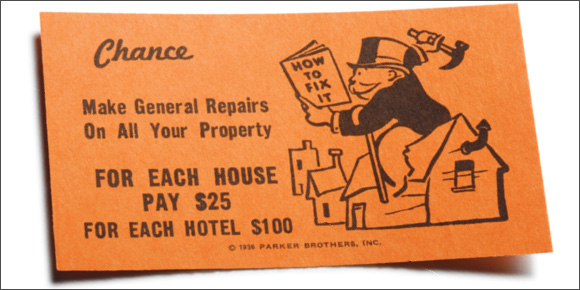Real estate smarts provide a good start for what you need to know to become a landlord, but there’s much more to learn to become successful.
By Michael Chazin
Renting has become very popular, often because renters can’t afford to purchase a home, want the flexibility of easily changing locations or don’t want to deal with maintenance issues. This trend has driven up rents in most housing markets. Is it time for you to leverage your knowledge about real estate and become a landlord to supplement your income? Before deciding, here’s what you need to consider.
Everyone believes the major advantage of being a landlord is improved cash flow.
It’s a Manager’s World
Landlords hire a property manager when they don’t have the skills to manage a property or don’t want to be bothered, says Marc Goldin, CRS, The Goldin Group, Atlanta. When something needs to be done on one of his rental properties, he says, tenants don’t call him, they call the property management company.
At first, REALTORS® need to get an education. “Even if you want to do it on your own, hire a property manager to begin with,” says Goldin. Watch what they do for a year or two, he says, until you feel comfortable taking over the function.
“That’s partially right,” says George S. Wonica, CRS, associate broker at Wonica REALTORS® & Appraisers, Inc., Staten Island, New York. “But it is also about your net worth at the end of the term.” Wonica bought his first rental property at age 19. Now, more than 20 years later, he owns buildings free and clear, which supplements his income and takes pressure off his real estate sales performance.
Becoming a landlord and gaining the benefit of a supplemental income is probably easier than ever. “When I started as a landlord years ago, I had a 35 mm camera, a legal pad and a pen for taking notes,” says Greg Glosson, managing broker, Fast Track Realty, Memphis. Today, agents can take an iPad into a listing, video the entire property and have all that information at their fingertips.
Landlord Challenges
Keeping track of all the moving pieces is one challenge every landlord faces.
To start, REALTORS® should take an inventory of their strengths and weaknesses prior to purchasing a property, Glosson says. He suggests an honest conversation about who will handle maintenance—is it something you can do yourself? Will you screen tenants on your own or have someone do it for you?
Next, establish a network of people to call upon for support and advice. Most REALTORS® probably have these relationships already, but they take on renewed importance once you become a landlord. “If you plan to finance purchases, you need a lender as part of your team,” Glosson says. You’ll also benefit from close relationships with a real estate attorney, insurance agent, CPA/tax advisor, as well as inspection professionals.
The successful landlord has procedures for every step in the rental process. “It’s important to have systems,” says Marc Goldin, CRS, The Goldin Group, Atlanta. Selling a residential property has fewer actions to worry about compared to renting out a property—you show it, write a contract, do an inspection and close. “Renting has more steps,” he adds. You have to screen tenants, worry about maintenance, contract for liability insurance, collect rents—and those are just a few of the required activities.
Your Landlordline
In a May survey of nearly 1,000 buyers, Redfin, a national real estate brokerage, found these are homebuyers’ top worries:
- Consumerism Commentary ❘ Earning a Living with Rental Properties: Should You Be a Landlord?
- Bloomberg ❘ Landlord Nation: Boomers’ New Retirement Plan Is Millennials Paying Rent
- Trusted Choice—Independent Insurance Agents ❘ Landlord Liability Insurance for Tenant Injuries and Claims
- U.S. Federal Trade Commission ❘ Using Consumer Reports: What Landlords Need to Know
- MrLandlord.com ❘ All The Keys to Your Landlording Success
- Zillow ❘ Landlording 101: A Rental Management Guide
The Devil Is in the Details
With all the moving parts involved in successfully managing rental properties, landlords need to be detail-oriented. Drawing up a lease sounds simple and preprinted templates give the appearance of professionalism. “We put in lots of special stipulations to protect the parties involved,” Goldin says. “You can’t miss those details.
“Being a great sales agent might give you a head start in understanding the basics, but it’s not enough,” Goldin says. Find the time to educate yourself when you start, and then keep on learning as you add more rental units. “Find a mentor who is experienced in property management,” he adds. “Take him or her to lunch.”
Can You Manage It?
A big issue is whether you will manage the property yourself or engage a property manager. Landlords can outsource many functions, says Ken Clark, president, VIA Group Realtors, Des Moines, Iowa. “We contract with companies to do credit reviews, eviction histories and even sex offender reports nationwide,” he says.
A key decision is whether to outsource these management functions or perform all the activities on your own. Glosson has managed his own properties over the years and questions whether he would make the same choice again. “It’s time-consuming,” he says. “We probably would have had higher occupancy rates if we had engaged a property manager.”
Goldin agrees that time investment is one of the biggest drawbacks to self-management. “Calls from tenants for normal maintenance, emergency calls and answering questions can take an inordinate amount of time,” he says.
It can be frustrating to receive calls from someone who doesn’t have heat or whose toilet stops working, Wonica says. “Surround yourself with good tradespeople who you know can get out there when something happens.”
Risk Management
Liability might be the biggest hurdle. Knowing landlord-tenant law and being properly insured are both important, Goldin says. Are you properly insured in case something bad happens? Dave Rancourt, principal with Rancourt and Rancourt, Inc., Sarasota, Florida, and a member of the board of directors of the National Society of Accountants, strongly suggests that landlords treat management of their rental properties as a business. He suggests establishing an LLC to hold the property. “In case of liability, the LLC gets sued,” he says. “You don’t.”
On the Plus Side
Headaches aside, there can be a solid upside to being a landlord in the form of tax savings. Tax advantages accrue when you own rental property, Rancourt says.
“Depreciation provides the means to deduct rental property costs over a specified recovery period expressed in years, which provides a major tax deduction,” he explains. Landlords can also write off expenses, including mortgage interest and taxes.
The ultimate choice to become a landlord rests with the REALTOR®. “I don’t understand why more agents don’t invest in real estate,” Glosson says. “We are the market experts, we know what is available and we have the teams in place. As REALTORS®, we should invest in our communities.”
Want more information? Check out CRS 204–Buying and Selling Income Properties. There’s more than a dozen courses booked this year around the country.








